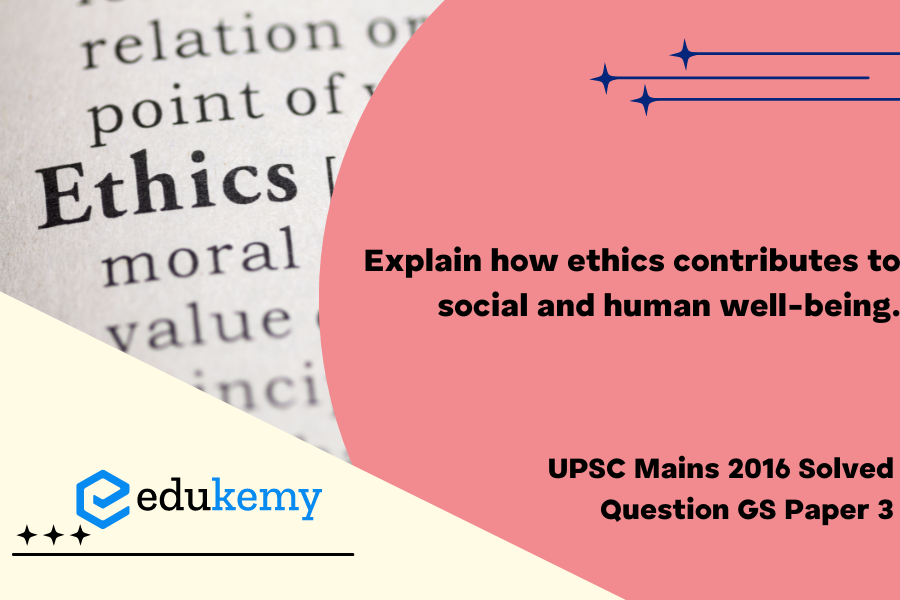Ethics, the moral principles that govern human behavior, plays a pivotal role in enhancing social and human well-being. At its core, ethics provides a framework for individuals and societies to distinguish right from wrong, guiding actions that contribute to the overall welfare of both the individual and the community. A society grounded in ethical values fosters trust, cooperation, and a sense of justice among its members. Ethical behavior promotes fairness, equality, and respect for diverse perspectives, laying the foundation for harmonious social interactions. Moreover, ethical considerations extend beyond individual actions to shape institutional policies and practices, influencing the distribution of resources and opportunities. In essence, adherence to ethical principles fosters a healthy and flourishing social environment where individuals experience a sense of belonging, security, and fulfillment, ultimately contributing to the holistic well-being of humanity.
Tag: Ethics and Human Interface.
Contents
Decoding the Question:
- In the Introduction, try to define Ethics and the need for it in human life.
- In Body, explain the contribution of:
- Ethics and Social well-being.
- Ethics and Human Well-Being.
- In Conclusion, try to conclude with ethical contributions in other aspects apart from social and human well-being.
Answer:
Ethics can be defined as societal morals. Ethics give as a perception of right and wrong and guides in decision making. The basic instinct of all life is self-preservation. This results in self-oriented thinking and actions. By socialization we inculcate ethical values and the person learns the merits of cooperative behavior and widens his perception. The individual is integrated into family, community, village, state, nation, and humanity, and action is calibrated accordingly.
According to the French philosopher Albert Camus, “A man without ethics is a wild beast loose upon this world”.

Ethics and Social and Human Well-Being:
- Ethics and Social well-being: Ethics trains Human mind to think logically and reasonably and to handle moral issues with greater clarity. All actions, whether one is aware of it or not, in some way or another affects the others. Thus, ethical problems confront everybody. Nobody can get through life without ethics, even if one may not be aware of the ethical principles.
- Consciously or unconsciously human beings are making moral decisions. In the absence of an ethical approach to social life, there is the presence of Matsya Nyaya where no one can have even momentary peace due to the absence of mutual trust.
- Ethics and Human Well-Being: Ethics deals with the ideal life in which human beings should lead. There are various views about the chief good or aim of life. One such aim is pleasure, conceived as consisting simply in the gratification of the particular impulses as they arise. This is known as hedonism.
- Some thinkers like Hobbes and Nietzsche have taken a radically different view arguing that people may pursue power or self-assertion as an alternative goal.
If there was a decline of ethical behavior in the society, it would lead to trouble. People might indulge in self-aggrandizement, Corruption, disregarding environmental damage, etc. Though this might in the short run seem beneficial and profitable, in the long run, it would be detrimental to the individual as well as the community. Human well-being comprises numerous dimensions from emotional well-being to healthy life. Without ethical behavior there would be all-round chaos and confusion. Thus, ethical action helps in securing social and human well-being. Ethics helps a person to look at her own life critically and to evaluate his actions, choices, and decisions.
In case you still have your doubts, contact us on 9811333901.
For UPSC Prelims Resources, Click here
For Daily Updates and Study Material:
Join our Telegram Channel – Edukemy for IAS
- 1. Learn through Videos – here
- 2. Be Exam Ready by Practicing Daily MCQs – here
- 3. Daily Newsletter – Get all your Current Affairs Covered – here
- 4. Mains Answer Writing Practice – here


